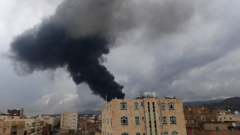The United Nations Secretary-General stressed that the famine's impacts are a severe indictment of global efforts to address crises, urging immediate aid.
**Famine in Gaza City: UN Chief Declares 'Failure of Humanity' Amid Crisis**

**Famine in Gaza City: UN Chief Declares 'Failure of Humanity' Amid Crisis**
Antonio Guterres highlights a humanitarian disaster as half a million face starvation in Gaza.
The United Nations Secretary-General, Antonio Guterres, condemned the ongoing famine in Gaza City as a "failure of humanity", emphasizing the dire humanitarian implications of the situation. The Integrated Food Security Phase Classification (IPC) has elevated the food insecurity status in Gaza to Phase 5—the most severe condition. This classification indicates that over 500,000 residents are facing catastrophic circumstances, including starvation and death.
Despite Israel's outright denial of starvation within the territory, the UN and numerous humanitarian organizations assert that aid restrictions imposed by Israel are exacerbating the crisis. The IPC report meticulously outlines the urgent need for a large-scale response, warning that, without intervention, famine-related deaths could escalate significantly.
The report anticipates an alarming rise in malnutrition affecting 641,000 individuals by late September, predicting that nearly one-third of Gaza's population would be engulfed in starvation conditions. Tragically, the health ministry in Gaza has reported the deaths of 271 individuals due to malnutrition, including 112 children, since the onset of the conflict.
Local residents recounted their painful experiences. Reem Tawfiq Khader, a mother of five, revealed her children are unfamiliar with basic foods such as fruits and vegetables. Meanwhile, a parent named Rida Hijjeh expressed despair over her daughter's significant weight loss, attributing it to the famine's harsh realities.
In a vehement response, UN aid chief Tom Fletcher attributed the preventable famine to systematic obstructions imposed by Israel on aid. Guterres qualified the situation as a moral indictment—stating that it is not a mystery but a dire example of a man-made disaster. He highlighted Israel's obligations under international law, insisting on its responsibility to ensure food and medical supplies reach the population.
Philippe Lazzarini, head of the UN agency for Palestinian refugees (UNRWA), underscored the man-made dimensions of the famine, asserting it is orchestrated by Israeli government policies. UK Foreign Secretary David Lammy described the humanitarian disaster as a moral outrage, directly linking it to Israeli government actions.
In defense, Israeli Prime Minister Benjamin Netanyahu claimed that Israel aims to prevent starvation rather than cause it. He stated that over 2 million tons of aid have been permitted into Gaza since the conflict began, contradicting reports from the UN and humanitarian agencies that call for an increase in the daily number of aid trucks to prevent widespread starvation.
Israel's military is currently preparing for a renewed offensive in Gaza amidst a backdrop of intensified hostilities, which began following a surprise Hamas-led attack in early October, resulting in catastrophic loss of life. The ongoing military actions coincide with efforts to facilitate aid access, amidst persistent warnings from agencies that the influx remains grossly inadequate to meet the overwhelming need.
















